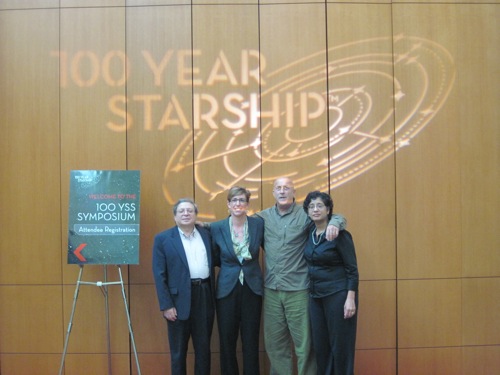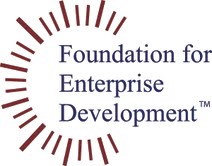FED Supports 100 Year Starship Enterprise
Published 10-03-11
Submitted by The Foundation for Enterprise Development
 In attendance at the 100 Year Starship Enterprise: From left to right, Joseph Blasi, Mary Ann Beyster, Joe Sibilia and Anu Bowman. (Photo credit: Fed.org)
In attendance at the 100 Year Starship Enterprise: From left to right, Joseph Blasi, Mary Ann Beyster, Joe Sibilia and Anu Bowman. (Photo credit: Fed.org)The Foundation for Enterprise Development (FED) team (fed.org) was selected to make a presentation at the NASA 100 Years Starship symposium in Orlando, Florida. The Symposium, held September 30 to October 2, was mounted by the US Defense Advanced Research Projects Agency (DARPA) and NASA’s Ames Research Centre. The fed.org was established in 1986 by Dr. J. Robert Beyster to promote the concept of broad-based, participative employee ownership and entrepreneurism. The event met its expectations, attracting roughly 1000 industry experts from throughout the US and internationally.
The presenting team is led by Mary Ann Beyster, president of FED, and includes Joe Sibilia (founder/CEO, Meadowbrook Lane Capital; CEO, CSRwire.com), Dr. Joseph Blasi (Professor, Rutgers University), Dr. Thomas Zurbuchen (Associate Dean for Entrepreneurial Programs, Professor of Space Science and Aerospace Engineering, University of Michigan), and Anu Bowman (Senior Technology Fellow, Foundation for Enterprise Development). The team presented their 'white paper' describing governance structures and shared capitalism models that support long-term innovation; technology, entrepreneurship, education; and alternative financing for sustainable public/private interests. Today, the FED actively funds inter-disciplinary research and development of business school and engineering curricula. They also create and engage in research and education programs that inspire innovation and entrepreneurship for solving problems of national and global importance.
Abstract:
The Foundation for Enterprise Development (FED) explores application of democratic representative governance models and structures for long-term interdisciplinary research, development and education to the concept of an organization that can sustain activity in support of interstellar travel in the 100-year timeframe, as outlined by the 100 Year Starship™. The paper titled, Sustained Innovation Through Shared Capitalism and Democratic Governance, explores the roots of representative structures and organizations as long-lived success stories throughout history. Research, innovation, organizational structures and associated issues are explored to address the long-term focus required for development, both material and human. Impact investing vehicles are also explored as more tailored and suitable investment structures addressing the long-term horizon required by the organization. The paper provides an illustration, description and philosophical approach of this model as developed by the FED and our collaborators.
Introduction:
The Defense Advanced Project Agency (DARPA), with the National Aeronautics and Space Administration’s (NASA) Ames Research Center as their contracting arm, have expressed another grand challenge—long distance manned space travel. Their challenge includes committing ourselves to spending the next century tackling the key technological, socio-political, and economic problems to develop a viable and sustainable non-governmental organization for persistent, long-term, private-sector investment into the myriad of disciplines needed to make long-distance space travel viable. In short, they are seeding a 100 Year Starship™.
With 100 Year Starship™, the stated vision is much larger than technology development or national security. DARPA has expressed a desire to create a renewed enthusiasm and “wonder” across a broad range of research and development, including science, technology, engineering and math (STEM) but also in humanities, arts, management, financing and other related areas for the success of long distance, long duration spaceflight. Benefits are not only expected to extend into private and commercial sectors, but to be lead by them.
Following a workshop in January of 2011, which was by invitation only, DARPA has opened up the dialog to all interested parties via a public symposium to be held in Orlando, Florida, from September 30th through October 2nd, 2011. With this paper, the Foundation for Enterprise Development, a non-profit operating foundation established in 1986, has led an expert team to help answer the question about the ownership and governance, organizational design, and investment vehicles for the sustainability of the 100 Year Starship™.
For more than 25 years, the FED has advanced entrepreneurship, innovation and broad-based ownership models through research, education and consulting services to executive, managers, non-profits, universities and government. With this paper, the FED reaches out to experts in investments, research and development, and education to share a philosophical approach, which can serve as a foundation for design and operational elements of the 100 Year Starship™ entity.
About The Foundation for Enterprise Development:
The FED is focused on helping the sustainability and growth of U.S.-based science and technology companies through its research, education, and services that advance innovation and broad-based ownership. www.FED.org.

The Foundation for Enterprise Development
The Foundation for Enterprise Development
The Foundation for Enterprise Development (FED), established in 1986 by Dr. J.R. Beyster, is a non-profit foundation focused on helping the sustainability and growth of U.S.-based science and technology companies through its research, education, and services that advance innovation and broad-based ownership.
The FED strives to increase awareness of ownership and management principles among students, entrepreneurs, and business leaders through educational curricula. The FED also creates and engages in research and education programs that inspire innovation and entrepreneurship for solving problems of national and global importance.
The FED encourages entrepreneurs to foster a culture of innovation within their company and is also committed to fostering business principles that support the creation of an ownership culture with employees who grow the company. Our guiding principles include:
- Give employees the freedom to create the kind of business and environment they would be passionate to work in.
- Encourage entrepreneurship and superior performance, and give employees ownership of the organization and rewards commensurate with their contributions.
- Create an empowering culture where employees have a say in the policies and management of the company, know how the company makes money and is performing, and take actions for sustainable long-term and short-term performance.
The FED is working with universities across the nation and in particular we support the Beyster Institute at University of California San Diego, which is teaching graduate-level courses, conducting webinars, running the leading national employee ownership conference, presenting at numerous conferences, and consulting directly with more than 100 companies on employee ownership. We also collaborate with Rutgers University, a leading research university in employee ownership and administrator of an international fellowship program on employee ownership.

